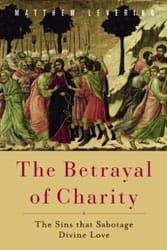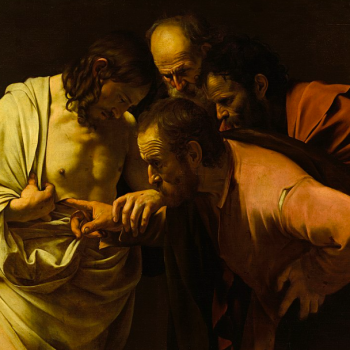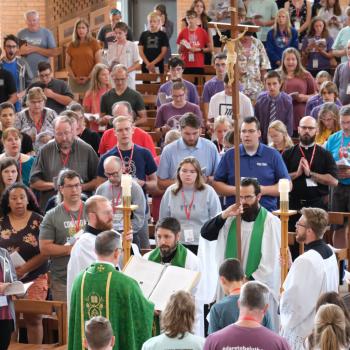 In this interview with Catholic theologian Matthew Levering, his friend and fellow theologian Jana Bennett provokes reflection on the true nature of love, Catholic theology and the process of writing. (Read more about Matthew Levering's book The Betrayal of Charity at the Patheos Book Club.)
In this interview with Catholic theologian Matthew Levering, his friend and fellow theologian Jana Bennett provokes reflection on the true nature of love, Catholic theology and the process of writing. (Read more about Matthew Levering's book The Betrayal of Charity at the Patheos Book Club.)
You have several thoughts on why contemporary people do not think about sin and love well. What should moral theologians be most aware of as we do our work?
I think that it helps to reflect on what makes love or charity distinctive. Aquinas's point that love has interior and exterior effects makes sense—joy and peace, benevolence and mercy/almsgiving. Then we can reflect on the opposites of these interior effects, and see how they affect our lives (envy, sloth, contention, strife, and so forth). We can also learn to recognize the interior and exterior signs of love as part of our quest to become people who love God and each other.
In my classes, I often hear echoes of the Beatles song, "All You Need is Love" because my students tend to think that is. What would your response be?
Love in this sense tends to be romantic love. By "romantic" I mean that it is based on pleasurable feelings and an assumption that so long as those good feelings are there, everything is okay. When we look at the nature of love more closely, we can see that it is characterized, as I mentioned above, by joy, peace, benevolence, mercy, and almsgiving. We then are led to inquire into what are the components of true peace, and into what doing good to another person and meeting their true needs really means. Love understood in this way begins to take on more fiber, and its relationship to other virtues—prudence, justice, courage, temperance, as well as faith and hope—begins to take shape.
Thomas, of course, is a favorite interlocutor of many moral theologians. I think I see his name referenced in at least a third of all our posts. Are there particular directions you might encourage moral theologians to take in their reading of Thomas?
I am impressed by the story of St. Thomas praying before the Eucharist, and the Lord asking him what reward he wants, and Thomas answering "Only You, Lord." This story shows how the various aspects of Thomas's theology come together in love for Jesus Christ, who leads us to union in the Holy Spirit with the Father. To wrap our minds around Thomas's theology, we benefit from getting a sense for the intensity and purity of Thomas's love, his desire for union with the Lord.
 I'd guess that many people would call you a "systematic theologian," but Betrayal of Charity deals with a lot of things moral theologians think about (sin and charity chief among them!). Is this a comment, in some way, on how Catholics tend to divide theological disciplines?
I'd guess that many people would call you a "systematic theologian," but Betrayal of Charity deals with a lot of things moral theologians think about (sin and charity chief among them!). Is this a comment, in some way, on how Catholics tend to divide theological disciplines?
It is a lot of fun to learn about different theological disciplines. For one thing, writing this book gave me the opportunity to read the work of a number of moral theologians whose work I might not otherwise have read. It was a joy to learn from them, and I respect that they have expertise that I can only hope to gain. I had the same experience in writing my 2008 book Biblical Natural Law, which is essentially an introduction to natural law doctrine. Specialists in one area can get caught up in reading only works in their area and even, at times, only works by their friends in that area. So I am always grateful when my work in moral theology is read by specialists who can sift the wheat from the chaff.
At the same time, in The Betrayal of Charity I try to bring together systematic and moral theology in a more deliberate fashion, even within the individual chapters. Since all the areas of theology are connected—Trinitarian doctrine, Christology, sacramental theology, moral theology, etc.—theologians need to read widely whenever possible.
You have often said that writing is one of the ways you think things through and figure things out. What would you say writing this book most helped you think about?
Mainly, I tend to discover how ignorant I am, and I try to make a slight dent in that ignorance. It is always a good reminder to me that theology is not faith, i.e. that faith seeks understanding but doesn't require that I understand everything before I believe in Jesus. Theology is a pondering on what I receive in faith; as a contemplative exercise, theology is not about making faith relevant but about rejoicing in and seeking to get to know better the realities of faith. So in writing this book, I came to see more and more how deep God's love is, and how God is infinite joy and peace. It is exciting to have been created by such a God, and to be forgiven and drawn into his life on an eternal adventure.
Is there anything else you'd like to mention about the book or other work of yours?
Writing, for me, means that I get to read the work of many others, and to share in a conversation that is going strong today among believers. This conversation is a way of responding to the Gospel. Jesus Christ teaches us about who God is, and we learn together as fellow students of the Lord.
8/11/2011 4:00:00 AM




